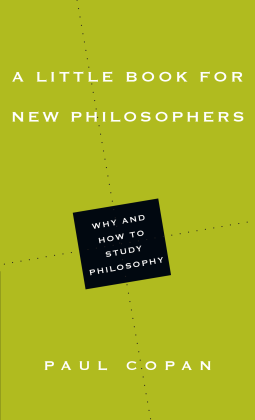
A Little Book for New Philosophers
Why and How to Study Philosophy
by Paul Copan
This title was previously available on NetGalley and is now archived.
Send NetGalley books directly to your Kindle or Kindle app
1
To read on a Kindle or Kindle app, please add kindle@netgalley.com as an approved email address to receive files in your Amazon account. Click here for step-by-step instructions.
2
Also find your Kindle email address within your Amazon account, and enter it here.
Pub Date Nov 07 2016 | Archive Date Dec 28 2016
InterVarsity Press | IVP Academic
Description
Advance Praise
"Paul Copan's book is small in size but large in importance. The
audience is not just aspiring philosophers, but anyone in the church who
is interested in, curious about or even suspicious of philosophy. Copan
does a wonderful job of explaining what philosophy is, how it should be
done and the value it has for Christians."
—C. Stephen Evans, professor of philosophy and humanities, Baylor University
"Paul Copan has a special gift for making philosophy accessible to a
wide audience. Here he focuses on philosophically inclined Christians
who are fearful or cynical about philosophy. He contends that philosophy
done right can benefit our understanding and worship of God. I highly
recommend that all Christians who doubt the value of philosophy attend
to Paul Copan's lucid case. They will not be disappointed."
—Paul K. Moser, professor of philosophy, Loyola University of Chicago
Available Editions
| EDITION | Paperback |
| ISBN | 9780830851478 |
| PRICE | $9.00 (USD) |
Featured Reviews
 Brent P, Reviewer
Brent P, Reviewer
In recent years, certain Christian sects have taken an anti-academic view, holding that higher learning and abstract thinking is the road to secularism. In A Little Book for New Philosophers, Copan makes the case that Christianity has nothing to fear from such pursuits and is strengthened by sound wisdom.
After all, if philosophy is by definition the love of all wisdom, then Copan argues if as we believe “Christ rules over every square inch of the universe”, then “all truth is his”.
Copan explores the use of philosophy and philosophical arguments by Christians. He points out that when Paul confronted the Stoics at Athens he did so by quoting Stoic thinkers. From the very beginning Christianity has used philosophy and reason as tools to educate and engage in discourse with non-believers. There is little need for the religious to adopt a standoffish manner with such learning in modern times.
In discussing the need for philosophy, Copan touches on familiar battlegrounds from the defence of miracles, the problem of induction and also the hard problem of consciousness. Each are broken down and explained, highlighting that the study of philosophy does not necessarily lead to atheism and that strong arguments for theism can be found within.
Finally, the book closes with considerations for Christians wanting to pursue philosophy academically. It is not simply a call to man the ramparts, Copan cautions that philosophy should studied by those with a love and talent for it.
Copan reminds us that philosophy is neither a path to Atheism nor a blunt tool to be wielded against the irreligious. Instead as with all we do, the study and love of wisdom can be an act of worship intended to bring us closer to discovering God’s truth.
 Steve B, Reviewer
Steve B, Reviewer
This may be a little book but it tackles a large task: examining how and why Christians should study philosophy. Philosophy has been more than a little denigrated in the church, it has become a byword for worldly thinking or at best a tool for theology. So Copan’s task is an important one. Copan’s aim is ‘that this small book will offer new material for some, reminders for others and, hopefully, reinforcement for all to look afresh at the implications of doing philosophy under the lordship of Christ’ (9). The need to do philosophy under the lordship of Christ is crucial. For those beginning to study philosophy will find this book a helpful guide.
Copan sees a number of important roles for philosophy. These include sharpening our minds, helping us see that ideas have consequences, to isolate and deal with sloppy thinking. These are all crucial roles and not just for Christians. In addition he for Christians he sees philosophy as being able to strengthen theology. Though we need to be careful to see philosophy as the handmaiden of theology. Philosophy should not be a naturalistic tool, as Copan puts it: ‘If God is the originator of the universe, why can’t he also be at work within it? Why must the Christian bow to naturalistic demands and assumptions?’ (90).
What is perhaps most surprising is that one of the foremost Christian philosophers, one who has done much to establish Christian philosophy, Herman Dooyeweerd is not mentioned in this book. Nevertheless, this book will help philosophy student see that philosophy can be a much a Christian calling as doing theology, and as such it is a welcome addition to this new series of ‘Little Books’. As Copan has it:
‘Ultimately, our philosophizing—as with our eating, drinking or whatever we do—should be done to the glory of God. Undertaking the study of philosophy should be an act of worship, and thus we devote our mental exertions, our research and our reading to God. Our philosophy should be undertaken in a spirit of prayer and dependence on God for understanding, insight and wisdom about what projects to undertake’ (119-120)
Amen to that!



